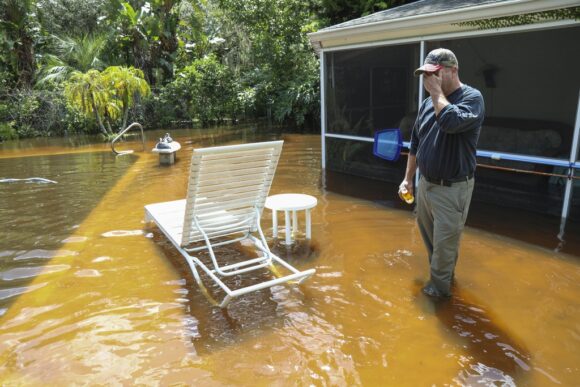The number of Florida claims from Hurricane Debby, filed within five days of the storm, already is almost half of the number of claims filed from Hurricane Idalia in a three-month period.
Debby claims by Friday had reached more than 11,900, the Florida Office of Insurance Regulation reported after compiling required data from property insurers. Idalia, which pummeled the same region of the state in 2022, produced 25,047 claims by Nov. 16, 10 weeks after landfall.
The surprising number of early claims from Debby came despite Idalia being a stronger Category 3 storm, with more expected wind damage in the Big Bend area of the state. So far, though, the value of Debby claims is much less than Idalia’s – just over $89 million. That’s less than a third of the value of Idalia claims after 10 weeks.
OIR officials did not speculate on reasons for the quick surge in claims from Debby. It could be that property owners learned from Idalia to file claims quickly, or that some homes raked by Idalia received secondary damage in Debby. Debby may also have brought more damage to more populated areas near Tampa.
The numbers came out Friday evening, the same time that Florida Insurance Commissioner Michael Yaworsky posted a bulletin noting more encouraging signs that Florida’s property insurance market is on the mend after legislative changes in 2022 and 2023.
Yaworsky noted that State Farm and Progressive insurance companies had recently pledged to continue writing property in Florida, and another new company, Trident Reciprocal Exchange, has been approved. Trident is the ninth new company to be approved for the Florida in the last year.
“Today’s announcements are a further indication of the continued strengthening of Florida’s property insurance market,” said Yaworsky, who met with Progressive executives last week. “OIR will continue to work with Florida-based and national carriers, like Progressive, to recruit and retain business so that all Floridians may benefit from a strong market.”
He highlighted other positive signs:
Rate increases have slowed. Over the past six months, the average rate increase request for homeowners insurance is 1.2%, a vast difference from recent years of requests that were as much as 56%. A year ago, the 30-day average rate increase request from carriers was 7.6%, Yaworsky said.
Reinsurance: Early results from a recent data call with insurers show that reinsurance costs for Florida insurance companies decreased an average of 1.7% from 2023 – the first decrease in years.
Policies in force: As of Q1 2024, 7.43 million residential insurance policies were in force in Florida. Some 83% of those are written by admitted property insurers, as opposed to surplus lines companies or the state-backed Citizens Property Insurance Corp. Recent data from the Florida Surplus Lines Service Office show, however, that for personal and commercial coverage, surplus lines’ share of the market has continued to grow in the last six years.
Citizens depopulation: So far this year, OIR has approved 768,692 takeouts from Citizens to private carriers, an 855% increase over 2022’s takeout numbers. To date, though, only 132,445 policies have actually been accepted or removed from Citizens, OIR said. Some homeowners have said that premiums offered by private insurers on takeouts were many times higher than Citizens, the South Florida Sun Sentinel recently reported.
As of the end of June, Citizens reported 1.2 million policies in force.
Reducing the size of Citizens’ book of business is necessary to avoid potential surcharges on Floridian’s policies in the case of catastrophic losses, former Florida state Rep. Don Brown and former U.S. Rep. Dennis Ross wrote this week in a blog posted on Johnson Strategies’ website.
A Citizens’ surcharge, along with potential assessments on policies from the Florida Hurricane Catastrophe Fund and from the Florida Insurance Guaranty Association could raise homeowners’ costs.
“With all these potential assessments hovering over Florida policyholders, it is not only important for the state to stabilize our property insurance market to prevent more insurance company insolvencies, but to also transition as many policies out of Citizens into the private insurance market,” Brown and Ross wrote. “Fewer policies in Citizens equals less risk of assessments on policyholders who are already paying for their own property insurance coverage.”
Photo: Kurt McAnly, of Riverview, Florida, wades around the front of his flooded property last week, following Tropical Storm Debby. (Dylan Townsend/Tampa Bay Times via AP)
Was this article valuable?
Here are more articles you may enjoy.



 Allstate CEO Wilson Takes on Affordability Issue During Earnings Call
Allstate CEO Wilson Takes on Affordability Issue During Earnings Call  Florida’s Commercial Clearinghouse Bill Stirring Up Concerns for Brokers, Regulators
Florida’s Commercial Clearinghouse Bill Stirring Up Concerns for Brokers, Regulators  A 10-Year Wait for Autonomous Vehicles to Impact Insurers, Says Fitch
A 10-Year Wait for Autonomous Vehicles to Impact Insurers, Says Fitch  US Appeals Court Rejects Challenge to Trump’s Efforts to Ban DEI
US Appeals Court Rejects Challenge to Trump’s Efforts to Ban DEI 


